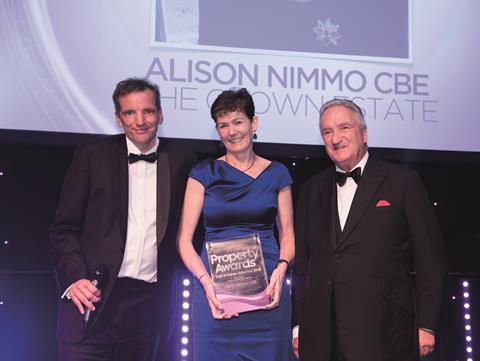Don’t be fooled by the soft Scottish accent, girlish laughter and gamine looks. Alison Nimmo may only have them in the proverbial sense, but she has bigger balls than most chief executives you will meet.

It certainly took sizeable ones to take the helm of The Crown Estate, and since taking over from Roger Bright in 2012, she has boldly gone where no man (or woman – she is the business’s first female chief executive) has gone before, presiding over the delivery of the biggest development pipeline in The Crown Estate’s history, ensuring the business outperforms the market year in, year out and showing the foresight to pivot from a traditional bricks-and-mortar approach to a customer-focused, services-based model.
Now, she has made arguably her boldest move of all, announcing that she will step down at the end of December 2019 at the height of her powers. Property Week caught up with this year’s double Property Awards winner – she was personality of the year and the first woman to be inducted into the Hall of Fame – at The Crown Estate’s state-of-the-art head office at 1 St James’s Market to ask: why now and where next, both for her and the business?
Nimmo is proud of the swanky new open-plan office, which they moved to last June and boasts moss booths, an interactive ‘future of real estate’ wall and sit-stand desks (Nimmo’s is usually set to the stand position), and wishes they had moved earlier.

That is pretty much the only regret she has, but after six and a half years with the business, she says she was always likely to call time at some point in her second term. “I have quite an unusual contract in that it’s in chunks of four years. It’s a warrant signed by the Queen,” she laughs. “Thinking ahead and talking to the chairman, it was a question of: did I want to sign up for another four years? I’ve never stayed anywhere for 12 years. Given where we’re at with the business and also for me personally, eight years felt like a good innings.”
”Given where we’re at with the business and also for me personally, eight years felt like a good innings”
While making the announcement 18 months out seems excessive, it reflects the nature of the business, she adds. “It feels early announcing [my departure] now, but we need that amount of time to go through a very formal public procurement process,” she says, adding that she is likely to play an informal role in their selection.
She is equally vague about her professional plans following her departure. “Really, I haven’t thought about it,” she claims. “It’s so far away.”
Time for a holiday
What she will say is that a “really decent holiday” is on the cards. “I’ve always looked jealously at other people who plan their careers and know exactly what they want to do next,” she admits. “I’ve never done that and I always felt it was a weakness. But actually, after I helped rebuild Manchester after the bomb, everyone said ‘oh, you’ll never get such an interesting job again’ and I went and did Sheffield and then, of course, landed the Olympics. Then, when I left the Olympics, everyone said ‘oh, that’s the best job you’ll ever do’, and then I saw the ad for The Crown Estate.”
Having started her career in the West End with Westminster City Council, Nimmo knew it was the job for her, just as she knew early on in her career that property and, more specifically, regeneration was her bag. Having studied planning at university and worked in planning at Westminster, Nimmo came into the industry via “the scenic route”, she says. “I’ve always been fascinated with cities,” she explains. “I never really thought about going into property, but when I landed at Drivers Jonas and did chartered surveying, I found my niche, which was regeneration – fixing places that were broken. I got sent to all the glamorous locations!”
She also found herself thrust into a very traditional, very male-dominated profession. Accepting her Hall of Fame award at the Property Awards, she gave a stirring speech about the need for greater diversity in the industry in the wake of the Presidents Club revelations.
Long way to go
A few months down the line, she is in two minds over whether the soul searching that followed the exposé and the Harvey Weinstein scandal signified the beginning of real change or was just a fleeting response to being caught out.
Pausing momentarily, she says: “I hope there’s real momentum for change. The gender pay gap statistics shone a very harsh light on us as an industry. I thought we’d be making more progress and the statistics showed we’ve got a long way to go.”
Asked whether she thinks the industry is misogynistic, she picks her words more carefully still. “I think it’s very traditional and I think it needs to change and I’ve always been very vocal about that,” she says. “All you can do is focus on what you can change.”
In Nimmo’s case, that is The Crown Estate, which she boasts is “the only property company that had anything like a decent gender pay gap position” and now has a board that is 50% female. It is not just diverse in terms of gender, but also in age and class, she adds, arguing that diversity is essential to the creation of a high-performing culture.
Nimmo knows all about what that looks like having been involved in the regeneration of Manchester city centre, with Howard Bernstein and Richard Leese, after it was devastated by an IRA bomb in 1996.
Snapshot: Alison Nimmo
- » January 2012: takes over as chief executive and second commissioner of The Crown Estate
- » July 2006-December 2011: director at the Olympic Development Authority, responsible for design, environment, sustainability, legacy and gender
- » December 2003-06: director at the London 2012/Interim Olympic Delivery Authority, playing a key role in the London 2012 bid team
- » January 2000-03: chief executive of Sheffield One, responsible for the setup and delivery of the partnership
- » July 1996-2000: project director at Manchester Millennium, responsible for the regeneration of Manchester city centre following the 1996 terrorist bomb. Seconded from KPMG
- » January 1995-2000: consultant at KPMG
- » October 1989-94: associate partner at Drivers Jonas
- » December 1986-89: Westminster City Council
- » 1985: gains BA Hons, Town & Country Planning (2:1) at Manchester University
The recipe for a successful regeneration project has obviously changed since then, but Nimmo’s biggest concern is not so much what the optimum scheme should look like as the level of support from government.
“One of the challenges of regeneration is it doesn’t feel like it’s a big priority anymore,” she says. “I don’t think it has as much commitment and money behind it as it used to have. There aren’t as many levers and tools as there used to be in terms of pulling in money and being able to do what is required.”
She also notes the fragmented ownership of many town centres. By contrast, Manchester benefited from having just a few major landowners, who were relatively easy to bring together, she says, albeit “probably in enlightened self-interest”.
Critically, she adds, the city had “a clear sense of direction and an absolute commitment and focus to making it happen through some really tough stuff”.
“I hope there’s real momentum for change. The gender pay gap statistics shone a very harsh light on us as an industry. I thought we’d be making more progress and the statistics showed we’ve got a long way to go”
Such vision seems to be lacking on Britain’s high streets. Again, says Nimmo, there are lessons to be learned from Manchester.
“When we were rebuilding Manchester, one of our biggest worries was that the Trafford Centre was being built six miles away from the city centre, which was basically a war zone. That really framed our thinking about what we needed to do to make the city centre attractive. It wasn’t just about retail; it was about bringing in a mix of uses.”
The future of the high street nevertheless looks precarious, particularly in the wake of the recent raft of CVAs. Many landlords have spoken out against what they regard as an unfair practice.
Nimmo too has reservations, but again chooses her words carefully. “These are difficult times,” she concedes. “We’ve been working with the BPF and back its stance. Used in the right way as part of a strategic approach to reshaping and refinancing a business, they are a powerful way of helping to rebuild businesses and keep jobs, but I think there are concerns about how they are being used.”
Next stage of the cycle
The rocky retail landscape is not the only challenge facing businesses like The Crown Estate at the moment. Nimmo explains the wider rationale behind its pivot to a more customer-focused, services-based model.
“With the new chairman and the market getting into the next stage of the cycle, it was a good opportunity to stand back and say: where next? What do the next 10, 20 or 25 years look like? It is a challenge, because what does the next week look like?”
As it has evolved from what she admits was a “very traditional landed estate” into “a modern, progressive business”, it looked at its four portfolios not just in the context of the changing nature of retail but also the revolution going on in the workplace.
Like other major landlords, it has introduced a flexible workspace offer, at One Heddon Street. It also entered a joint venture with VTS. “The market’s changing, the industry’s changing, the demographics are changing, tech’s changed everything,” reasons Nimmo.
In terms of priorities, the first is to get momentum behind the pivot, she says. “We’re looking quite hard at our business mode and the extent to which we’ve insourced and outsourced our business. We’re hiring people who reflect how the business needs to change.”
It has already hired a new data analyst and is currently looking to fill a senior brand marketing role and find a new head of business technology. Nimmo expects its headcount to grow by about 10% in the next 18 months.
However, the strategic shift does not mean it will stop being active, she insists. While over the past three years, The Crown Estate has been a net seller, Nimmo points out that through its Regent Street Partnership with Norges it recently bought the long-leasehold interest in JLL’s UK HQ on Warwick Street.

“A lot of people have got the handbrake on commercial projects, but we delivered over a million square feet of space in our regional portfolio last year and we’ve just pushed the green light on the extension at Fosse,” she says. “We’re just active, really. We find the more active we are, the more we outperform and we’ve outperformed the market now 10 years on the trot.”
It has done so by quite some margin. In its latest results, it posted a total return of 11% versus an internal benchmark of 8.2%, but over three years the return has been 12% versus 9%, says Nimmo, adding that it has delivered £2.7bn back into Treasury coffers over the past 10 years.
Citing the interview she did with Property Week in 2012 – the first after her appointment – she notes how much has changed since then. The value of the business then was £7.2bn, a figure that has since doubled to £14.1bn, while its net profit has grown by almost £100m to £328m.
Preparing for a slowdown
The performance gives the lie to the assumption that public bodies are less commercial than their private counterparts. “There’s the camp that thinks private sector is good and public sector is rubbish and that’s a load of rubbish, actually,” says Nimmo dismissively. “What I try and do is pull in the best of the public sector, which is long term and purpose and values driven, and bring in the best of the private sector, which is all about entrepreneurial flair. If you can blend them together then you’ve got a real success story and that’s what we’ve done within The Crown Estate.”

Whether it is able to maintain the momentum remains to be seen. “We’ve had a stronger year than we thought we would this year,” admits Nimmo. “We said last year we were preparing for a slowdown and I think we’re in the same place this year really, looking ahead and managing people’s expectations.”
Nimmo says that she is “very confident” in London’s long-term future and that while the impact of Brexit is a concern, she is not overly worried. “We’re far more focused on the changes in demographics and technology,” she says. “We think that’s going to have a far deeper long-term impact on us as a business.”
She won’t be drawn on the market outlook. “We don’t try and call the cycle,” she says. However, she admits: “We’re pretty cautious. We don’t see a lot of growth. So it’s steady as she goes this year.”
Even if growth does taper off in the next 18 months, Nimmo will be going out on a high. “I think it will have been an extraordinary thing really in terms of what we have achieved,” she says, promising more to come, even on Regent Street. “It’s like the Forth Bridge – there’s always more to do. We see as much potential in the next 20 years as we’ve unlocked in the last 20.”
You get the sense that her proudest achievement, though, is the transformation of The Crown Estate. Crediting her “really talented team”, Nimmo gestures to her surroundings. “It was such a team effort this, and what we’ve tried to do is reflect who we are as a business now. We’re not this fusty old traditional estate. We are this modern, progressive business and we can do things. We’re the best of the best. We’ve got our purpose on the wall.”
That purpose is: ‘Commercialism. Integrity. Stewardship.’ As Nimmo’s time at The Crown Estate draws to a close, what could be more fitting when she is the embodiment of those principles?






























No comments yet